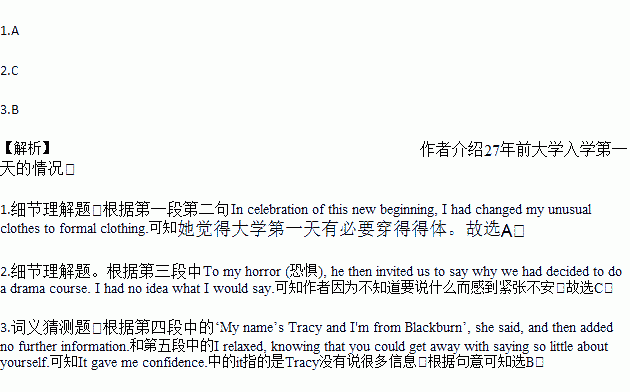题目内容
I had dressed quite nicely for my first day as a student at St. Anne's College of Further Education. In celebration of this new beginning, I had changed my unusual clothes to formal clothing.
Like many young people my age, I was under the impression that the best way to show your personality was by wearing the kind of clothing that my mother considered was not fit to be seen in public. But for my first day as a student I had made an effort to look what my mother called ‘respectable’.
There were fifteen of us, sitting in the theatre hall, while the head of the drama department, Mr. Wilson, gave us a warm welcoming speech. To my horror (恐惧), he then invited us to say why we had decided to do a drama course. I had no idea what I would say. The truth was that although I had a taste for unusual clothing, I was painfully shy.
My worry grew as it came closer to my turn. One by one, the new students excitedly explained their reasons. Then it was the turn of a girl who I hadn't really noticed until that moment because I was too busy thinking about what I would say. ‘My name’s Tracy and I'm from Blackburn’, she said, and then added no further information.
Everyone smiled politely in silence but I was impressed at her bravery in saying almost nothing even under pressure (压力). I relaxed, knowing that you could get away with saying so little about yourself. It gave me confidence.
After Mr. Wilson at long last let us out of the hall to go to lunch, I managed to find the courage to go up to Tracy. She looked very unfriendly. Taking a deep breath, I introduced myself. To my surprise, she looked up at me and gave me a very bright, sweet smile. That was twenty-seven years ago, and although we never did become famous stars, we're still best friends.
1.Why did the author dress nicely for her first day at college?
A. She felt a need to dress properly.
B. She wanted to fit in with the other students.
C. She was under pressure from her mother.
D. She wanted to look like a great star.
2.Why did the author feel nervous?
A. Because she had never spoken in public
B. Because it was her turn to start first
C. Because she didn't know what to talk about
D. Because the other students were so excited
3.What does the underlined word "It" in Paragraph 5 refer to?
A. Tracy also seemed extremely worried.
B. Tracy hadn't said very much.
C. The other students reacted politely to Tracy.
D. All attention was on Tracy.


 in the US conducted a series of experiments to examine food’s role in earning trust.
in the US conducted a series of experiments to examine food’s role in earning trust.